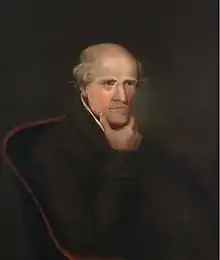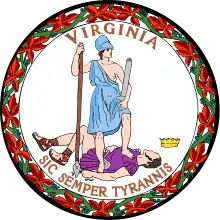John Tyler Sr.
John Tyler Sr. (February 28, 1747 – January 6, 1813) was a Virginia planter, slave owner,[1] 15th Governor of Virginia, United States District Judge of the United States District Court for the District of Virginia and the father of President John Tyler.
John Tyler Sr. | |
|---|---|
 | |
| Judge of the United States District Court for the District of Virginia | |
| In office January 7, 1811 – January 6, 1813 | |
| Appointed by | James Madison |
| Preceded by | Cyrus Griffin |
| Succeeded by | St. George Tucker |
| 15th Governor of Virginia | |
| In office December 1, 1808 – January 15, 1811 | |
| Preceded by | William H. Cabell |
| Succeeded by | James Monroe |
| Personal details | |
| Born | John Tyler February 28, 1747 York County, Colony of Virginia, British America |
| Died | January 6, 1813 (aged 65) Greenway Plantation, Charles City County, Virginia |
| Spouse(s) | Mary Marot Armistead (m. 1777; death 1797) |
| Children |
|
| Mother | Anne Contesse |
| Father | John Tyler II |
| Education | College of William & Mary read law |
Education and career
Born on February 28, 1747, in York County, Colony of Virginia, British America,[2] Tyler attended the College of William & Mary and read law with Robert Carter Nicholas Sr.[2][3] He was a planter and engaged in private practice in Charles City County, Colony of Virginia (State of Virginia from July 4, 1789).[2] He served in the Continental Army in 1775, during the American Revolutionary War.[2] He was a member of the Virginia House of Delegates from 1778 to 1788, serving as Speaker from 1781 to 1784.[2] He was a Judge of the Virginia High Court of Admiralty from 1776 to 1788.[2] He was a member of the Virginia Council of State (now the Virginia Governor's Council) from 1780 to 1781.[2] He was Vice-President of Virginia's convention to ratify the United States Constitution in 1788.[2] He was a Judge of the General Court of Virginia starting in 1788.[2] He was the 15th Governor of Virginia from 1808 to 1811.[2]
Virginia ratification convention
In the debates over ratification of the United States Constitution, Tyler was an Anti-Federalist, voting against the document at the Virginia Ratifying Convention in 1788. He explained his opposition stating, "It has been often observed ... that liberty ought not to be given up without knowing the terms. The gentlemen themselves cannot agree in the construction of various clauses of [the Constitution]; and so long as this is the case, so long shall liberty be in danger."[4]
Federal judicial service
Tyler was nominated by President James Madison on January 2, 1811, to a seat on the United States District Court for the District of Virginia vacated by Judge Cyrus Griffin.[2] He was confirmed by the United States Senate on January 3, 1811, and received his commission on January 7, 1811.[2] His service terminated on January 6, 1813, due to his death at Greenway Plantation in Charles City County.[2][3]
Honor
Tyler County, West Virginia is named in Tyler's honor.
Family
Tyler married Mary Marot Armistead (1761–1797) in 1776.[3] They were the parents of 8 children, including future President John Tyler.[3]
References
- Chitwood, Oliver Perry (1939). John Tyler, Champion of the Old South. Russell & Russell. pp. 10–11. OCLC 424864. Retrieved 22 October 2020.
- John Tyler at the Biographical Directory of Federal Judges, a public domain publication of the Federal Judicial Center.
- "A Guide to the Governor John Tyler Executive Papers, 1808-1811 Tyler, John, Executive Papers of Governor, 1808-1811 41223". ead.lib.virginia.edu.
- "Energetic Government: John Tyler, Virginia Ratifying Convention". press-pubs.uchicago.edu.
Sources
- John Tyler Sr. at The Political Graveyard
- John Tyler at the Biographical Directory of Federal Judges, a public domain publication of the Federal Judicial Center.
External links
- Archival records
| Political offices | ||
|---|---|---|
| Preceded by William H. Cabell |
15th Governor of Virginia 1808–1811 |
Succeeded by James Monroe |
| Legal offices | ||
| Preceded by Cyrus Griffin |
Judge of the United States District Court for the District of Virginia 1811–1813 |
Succeeded by St. George Tucker |
